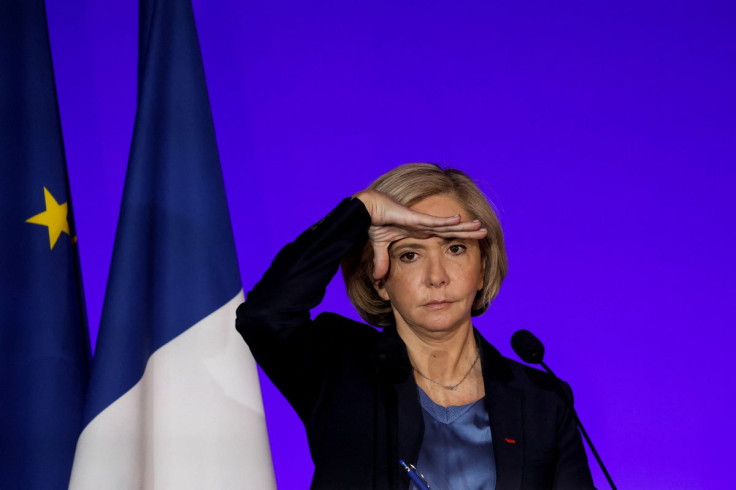France's Centre Right Fights For Survival And Cash After Vote Drubbing

It was going to be bad. It turned out to be worse. Conservative Valerie Pecresse scored below 5% in the first round of the France's presidential election, the centre right's lowest score in modern history and one which threatens its survival.
When the first projections flashed up as polling stations closed, stunned Pecresse supporters gasped: "What now?"
Having failed to cross the vote threshold needed to ensure her campaign expenses were partly refunded, Pecresse on Monday asked for urgent donations by mid-May to save the party as it look towards the legislative elections in June.
"What is at the stake is the very survival of Les Republicains and beyond, the very survival of the Right," she said on arrival for an emergency party meeting.
Only a decade ago, Nicolas Sarkozy was readying himself to run for a second mandate after almost 17 years of centre-right rule in France.
Now, the Les Republicains party's existence is under threat after its voters turned to incumbent Emmanuel Macron, far-right challenger Marine Le Pen and extreme-right candidate Eric Zemmour, seeing no value in casting their ballots for the traditional right.
The movement has struggled to remain relevant since Macron became president in 2017.
He has been able to dynamite the Socialist party, which also got record low support on Sunday 10 years after Francois Hollande beat Sarkozy for the presidency in 2012, and capture a chunk of centre-right supporters as he promised a neither left nor right political offering.
His economic policies overlap with theirs and as he has sought to siphon votes from the right by toughening his stance on security and immigration over the last 18 months, that has increasingly divided centre-right voters and politicians who have been unable to find a clear vision for their party.
The party meeting decided there would be no votes for Le Pen in the runoff against Macron on April 24. Pecresse said in her defeat speech on Sunday she would vote for Macron.
But highlighting the splits, 13 of the 115 political bureau members abstained and one voted against.
Party president Christian Jacob told reporters after the meeting the party wanted to remain independent and united.
"We are neither interchangeable in Lepenism or Macronism," he said.
LET COWARDS GO
The divisions have been apparent long before Sunday's election. The president of the southeast region Renaud Muselier and Sarkozy's former Budget Minister Eric Woerth abandoned the party. Others defected to Le Pen.
That lack of unity was again clear on Sunday night. While Pecresse and other heavyweights such as former Justice Minister Rachida Dati called for a Macron vote to block the far right in the runoff, others, such as the runner-up in the party primary Eric Ciotti, made it clear that he could not vote for him.
An IPSOS poll looking at a rollover of votes for the second round showed a three way split in Pecresse's support to Macron, Le Pen and abstentions.
"We're paying ... because we have tried to position ourselves in the centre," Les Republicans lawmaker Julien Aubert said, adding that he would not vote for Macron. "We are threatened with being reduced to almost nothing."
Secretary General Aurelien Pradie said the poor showing should clarify the way forward.
"The cowards will go to one side or the other. Let them go and leave it to the rest to come up with a political message," he said.
For some party activists the immediate priority is June's legislative elections, when the party will look to save its 101 lawmakers. For others, it is more long-term - their eyes already on the next presidential race.
"I don't think our party will collapse ... If Le Pen loses she is finished and if Macron wins it will be his last mandate so in 2027 there will be the need for something new and we will need to be ready," Florence Portelli, spokeswoman for Pecresse, said, adding that she did not want a rapprochement with Macron.
Many of the party activists Reuters spoke to insisted that the party was not dead.
Les Republicans still governs many of France's town halls and local authorities, giving it a political footprint that Macron's own party has struggled to build.
The hope is that if Macron were to win on April 24, he would struggle to win a parliamentary majority. Some in the party believe he will need the centre right to build a coalition.
Jacques, 67, a retired lawyer, said the priority would be to keep the party together for the next two months.
"It's a slap in the face, but people are no longer thinking rationally and want to be sold a dream," he said. "There is a risk the party will explode, but we need to regroup now."
© Copyright Thomson Reuters 2024. All rights reserved.





















